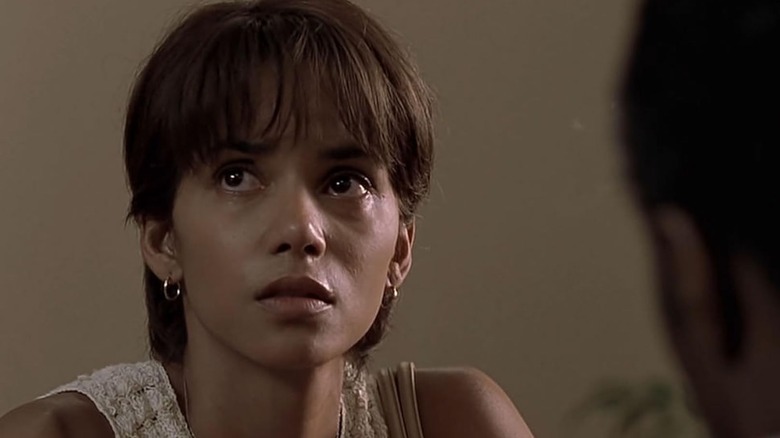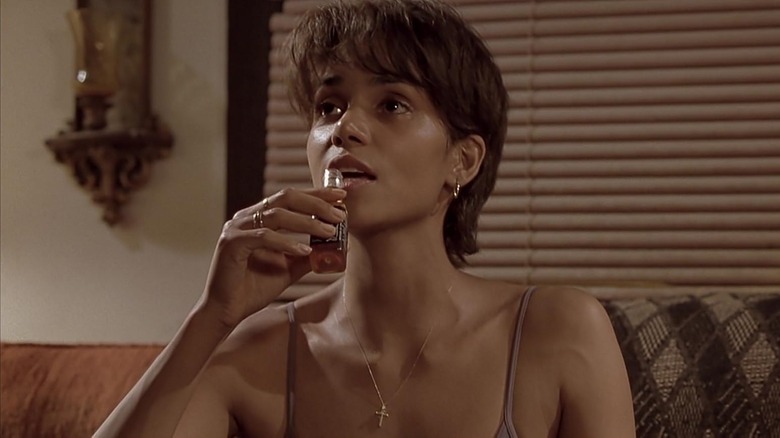Denzel Washington And Halle Berry Share A Significant Moment In Oscars History
In 2001, Halle Berry made history by being the first Black woman to ever win an Oscar for "Best Actress." She won it for her role as Leticia Musgrove in the romantic drama film "Monster's Ball." Berry was a favorite going into the award for her compelling lead performance, but it was still hard to believe going in that she'd be able to break the category's 70+ streak of white actresses winning. It was like how nobody could quite believe in 2008 that Barack Obama would become the first Black president; the polls said he had a good shot, but conventional wisdom said otherwise.
"This moment is so much bigger than me," Berry said in her emotional speech. "This moment is for Dorothy Dandridge, Lena Horne, and Diahann Carroll. It's for the women who stand beside me, Jada Pinkett, Angela Bassett, Vivica Fox. And it's for every nameless, faceless woman of color that now has a chance because this door tonight has been opened. Thank you. I'm so honored."
That same night featured the Best Actor award going to Denzel Washington for his role in "Training Day." Washington was the second Black actor to win the award, the second amongst five Black actors total.
"Two birds in one night, huh? Oh, God is good," Washington said in his speech. He gave a shoutout to the first Black actor to win the award, Sidney Poitier, who was in the audience that night and had earlier received an honorary award for his long career in the industry: "40 years I've been chasing Sidney [Poitier], they finally give it to me, what'd they do? They gave it to him the same night. I'll always be chasing you, Sidney. I'll always be following in your footsteps. There's nothing I would rather do, sir."
Poitier triumphantly waved his trophy in the audience, and Washington held up his own as a salute back to him.
Halle Berry was the first Black winner of the Best Actress Oscar (and currently the only)
Part of what made Berry's win feel so triumphant was the assumption that Black women winning the award would now become a more common event. Unfortunately, that didn't happen: As of 2025, she is still the only Black woman to ever win it, a fact that Berry finds a little depressing. "It's forced me to ask myself, did it matter?" Berry said in the recent Apple TV+ documentary "Number One on the Call Sheet." She asked, "Did it really change anything for women of color? For my sisters? For our journey?"
While 13 Black actresses had been nominated for the award in the years since, none of them won. "A few years ago, I was at the table with Andra Day, and I was across the room from Viola Davis, and they were both nominated for stellar performances," Berry said. Andra Day had starred in "The United States vs. Billie Holiday," and Davis had starred in "Ma Rainey's Black Bottom." Berry revealed, "I felt 100% sure that this was the year one of them was gonna walk away with this award. ... They both deserved it, and I thought for sure."
It was in 2016 that people really started to notice that Berry's win had been a one-time thing, because that was the year the Oscar nominations skewed even whiter than usual despite having no shortage of Black talent to choose from. Backlash to the lack of diversity in the Oscar noms led to the "#OscarsSoWhite" tag trending on Twitter, and to celebrities like Spike Lee boycotting the ceremony. "Saturday Night Live" even made a sketch about it, depicting an award show where they kept nominating white background actors even though the Black actors in the foreground were giving the real award-worthy performances:
The president of the Academy did release a statement after the 2016 controversy, announcing that they'd be changing the rules slightly to ensure a more diverse pool of nominations going forward. Sidney Poitier had to wait 38 years to see another Black man win the award; hopefully Berry won't have to wait that long to see the same.

